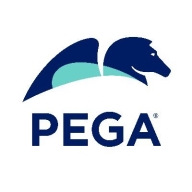

Pega Platform and ServiceNow Orchestration compete in the business automation and management sector. Pega Platform has an upper hand due to its strong BPM features and flexibility, although it may require specialized training.
Features: Pega Platform offers extensive customization, BPM capabilities, and low-code architecture, allowing flexibility and rapid prototyping. ServiceNow Orchestration integrates seamlessly in ITSM with robust automation, enhancing service management within its ecosystem.
Room for Improvement: Pega Platform needs to improve its user interface, RPA capabilities, and integration support for inexperienced users. ServiceNow Orchestration could benefit from more flexible integration, modular pricing, and better workflow handling to address cost structure challenges.
Ease of Deployment and Customer Service: Pega Platform supports multiple deployment options including on-premises and cloud environments, with mixed reviews on support. ServiceNow focuses on cloud deployment and provides prompt support, although adaptability in unique scenarios may be limited.
Pricing and ROI: Pega Platform's licensing fees are based on users or case volumes, offering high ROI due to its robust process management capabilities. ServiceNow Orchestration, though expensive with modular costs, proves valuable in IT service efficiency and workflow integration.


Pega Platform facilitates business process management, case management, and workflow automation for industries like banking, insurance, and healthcare. It supports digital transformation and customer service enhancements with its low-code capabilities and seamless integrations.
Pega Platform enables users to create efficient systems for case management, financial operations, and digital transformations. It provides tools for client onboarding, quoting, claims processing, customer experience improvements, and content management. Pega's low-code approach allows for the automation of complex processes, making it suitable for enterprises looking for adaptability and rapid deployment. While it offers strong real-time analytics and decision automation, users acknowledge challenges in user interface, integration, and performance aspects. High costs and a learning curve need attention, and enhancements in AI features and cloud services are desired.
What are the key features of Pega Platform?In banking, Pega Platform automates loan processing, accelerates customer onboarding, and manages compliance. Insurance companies benefit from streamlined claims processing and policy management. Healthcare sectors use the platform for patient engagement and care coordination, enabling organizations to adapt quickly to changing industry requirements.
ServiceNow is the fastest-growing enterprise cloud software company in the world above $1 billion (2018 revenue was $2.6 billion, up 36% year over year). We deliver digital workflows that create great experiences and unlock productivity to approximately 5,400 enterprise customers worldwide, including almost 75% of the Fortune 500.
We monitor all Process Automation reviews to prevent fraudulent reviews and keep review quality high. We do not post reviews by company employees or direct competitors. We validate each review for authenticity via cross-reference with LinkedIn, and personal follow-up with the reviewer when necessary.